
Training Scholarships: Esther’s Story
![]() Cairdeas
Cairdeas
![]() 1st November 2019
1st November 2019
Esther Nantongo Muyinga, is a Registered Nurse who was sponsored by Cairdeas to pursue a degree in palliative care at Makere University in Uganda. Esther had worked for many years on the wards but had never considered the need for patients to be cared for in a holistic way. In this blog, Esther shares what she learned from the course and how important palliative care is to the patients she cares for.
I am so grateful to Cairdeas Trustees and Supporters for the scholarship which was gifted to me in my first year pursuing a Bachelor of Science in Palliative Care at the Institute of Hospice and Palliative Care in Africa. The course has helped me to understand the role of palliative care in improving the quality of life of patients with life threatening illness and their families.
Through the course I gained knowledge and skills which enabled me to assess and assess, diagnose and manage the pain and symptoms of patients. I learned to communicate effectively when sharing information with patients and their families, gained an understanding of the different medications that can be used to address symptoms, and also shared with my workmates the assessment and management of these patients so as to improve their quality of life.
There is a difference between palliative care and curative care. Although both involve caring for a patient, palliative care takes a much more holistic view of this care. It involves the family and support networks of patients and requires communication skills to share information with patients and their families whether that is good or bad situation. It also involves assessing the pain of a patient. Following the course, I am now able to take a comprehensive pain history and record the details in the patient’s pain assessment chart.
As a result of this course, I have seen reduced stay of patients on the hospital wards after thorough assessment, as those who can benefit from the Home Based Care (HBC) are discharged and linked to HBC providers. The number of admissions has been reduced, because the patients have understood their diagnosis and management, and they understand when to come to the hospital and when to go to palliative care centers (Hospice).
Palliative care practice reduces the workload in the hospitals, saving money, time and resources.
A story of a patient that Esther has cared for...
Patient X was a 32-year-old female, married with two children. She had been unwell for 8 months with a complaint of right abdomen pain, which was treated as peptic ulcer disease (PUD) but with no relief. This later developed progressive abdominal distension associated with reduced appetite, weight loss and dyspepsia proceeding abdominal pain.
In October 2018, Laparotomy and Oophorectomy was done and a biopsy taken off. Histology results showed Krukenburg tumor. Following the results, she was initiated on chemotherapy in November 2018 and received seven (7) cycles with poor response. The tumors continued growing bigger and she became weaker and developed ascites. Because of poor response, chemotherapy was deferred. Frequent paracentesis was done and also pleurocentesis done once. At first the primary care team thought that the primary was the ovary, but then later it was discovered that the primary was the pancreas.
Patient X is employed by a law firm as an office messenger but she has not been working for 6 months now, and is worried of losing her job. She is cared for by her mother who is a tailor by profession, though because of the added responsibility is also no longer working. Her husband is a self-employed IT worker. X complains that when her husband visits her in the hospital he spends most of his time on the computer rather than talking and caring for her.
When I visited patient X she looked a young lady, very sick with mouth sores and a distended abdomen. I was able to offer various medication to help treat her symptoms, including oral gel to relieve the mouth sores. I advised her carer to give patient X the type of food she would like but in small quantities and to avoid fried foods and sweetened and citrus based drinks. The patient, the mother and the husband were given clear explanations about the diagnosis and management, and the husband was told of the importance of his availability and care to the patient.
We were able to discuss the financial burden with the patient and her family and linked them to the social worker for further support. She received continuous support through counselling. I was also able to pray with the patient and linked her with a spiritual leader for further spiritual support.
Patients with life limiting illness have to face difficulties that go beyond the physical symptoms of their illness. Through my course I now understand how, as a nurse, I can help to relieve these stressors and manage the pain and symptoms of a patients - physical, psychosocial and spiritual.
If you would like to support more scholarships like Ivan's, donate to our 2019 Christmas Appeal by visiting www.cairdeas.org.uk/get-involved/donate and selecting 'training scholarships' from the dropdown list.
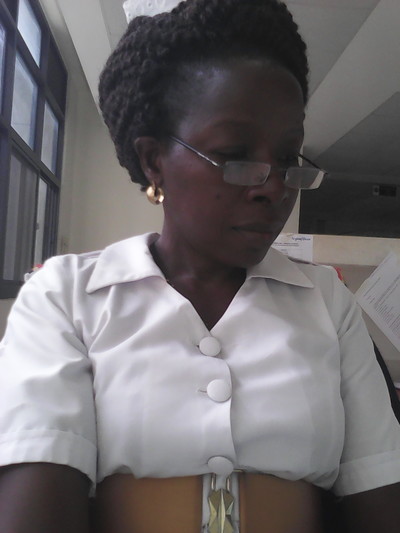
Esther Nantongo Muyinga recently completed a degree in palliative care with the support of Cairdeas.
Training Scholarships: Toko’s story
![]() Cairdeas
Cairdeas
![]() 1st November 2019
1st November 2019
I am Toko Friday Santiago, the Volunteer Coordinator for the Palliative care Education and Research Consortium (PcERC) at Mulago Hospital, Uganda.
I would like to thank Cairdeas Palliative Care Trust for giving me the opportunity to pursue a Bachelor’s Degree in Social work and Social Administration. Being able to excel with good grades without needing to do any retakes has been one of my greatest highlights and achievements since I began my studies. The course has been very interesting and encouraging to me in many ways. I have been able gain experience, improve my social work skills, and broaden my understanding and knowledge.
The course has also contributed to my development as a person through gaining analytical and practical skills and knowledge. This has helped me to make a difference in the lives of patients and their families at Mulago Hospital, especially those with life limiting illness.
Some of the challenges I have encountered include the expense of photocopying notes of all the lectures, and that transport keeps fluctuating during certain days especially during the rainy seasons.
However, since beginning my course I have built my confidence and assertiveness as a student leader in charge of the social work faculty. I also act as the Minister of Health within the Makere University Student Guild where I represent the students’ views and challenges and provide support during the class assessment presentations.
If you would like to support more scholarships like Ivan's, donate to our 2019 Christmas Appeal by visiting www.cairdeas.org.uk/get-involved/donate and selecting 'training scholarships' from the dropdown list.
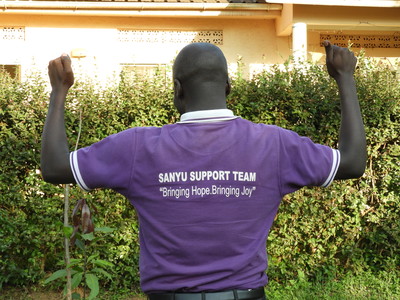
Toko showing off his Cairdeas-Sanyu T shirt
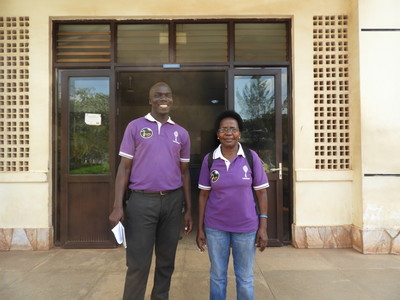
Toko and his colleague making visits as the Sanyu team
Training Scholarships: Palliative Care as Practical Theology
![]() Cairdeas
Cairdeas
![]() 16th October 2019
16th October 2019
Ivan Onapito received a Cairdeas Scholarship to study a 2-year Masters in Practical Theology at Africa International University. In this blog, Ivan shares the story of how his scholarship came about and how his studies benefitted the work he was carrying out at the Makere Palliative Care Unit. If you would like to donate to support our training scholarships Christmas appeal, follow this link.
At the beginning of 2011, I joined Makerere Palliative Care Unit as Volunteer Coordinator. This was a new role and I was tasked with setting up a team of volunteers to help in providing psychosocial and practical support to patients with life limiting illnesses, together with their families within Mulago Hospital and the Uganda Cancer Institute. This was after a needs assessment had been carried out showing a sizeable percentage of patients didn’t have these needs met. It was a daunting task, but due to the support of both internal and external mentors, we were able to get the programme up and running. My role later expanded to providing pastoral care to our patients.
The following year, we began having conversations about increasing my capacity through further studies. This would help in providing better care to our patients, create opportunities for research and also provide credibility for my role and our unit as a multi-disciplinary team.
Cairdeas graciously provided a scholarship for me to go and study a Masters in Practical Theology at Africa International University between 2013-2015. I was able to do a research on exploring the use of narratives as a tool in spiritual care for patients with life limiting illnesses. This research was presented at the Africa Palliative Conference in 2016 and the Global Seminar in Salzburg, Austria in 2016.
One of the benefits of this program was to make me even more aware of the need for capacity building among faith based leaders in areas of palliative care. I was involved in setting up a hospital ministry for my local church which we named ‘Sanyu’, meaning joy. We have established a good partnership with the community hospital and the volunteer team has grown to meet the spiritual and psychosocial needs of patients within the hospital.
For the past three years I have also been lecturing at Africa Renewal University, a Christian university training leaders and pastors to transform their communities. I teach practical theology courses, one of which is spiritual care for the sick. There is a great need to incorporate palliative care into theology programs so that even the furthest in the communities can have access to this care, have their holistic needs met and live with dignity even if they are dying. Cairdeas built my capacity through this scholarship. It was through this scholarship that I was able to get a teaching position at Africa Renewal University, and use the knowledge and skills acquired to train church leaders how they can be holistic in their care for the sick and vulnerable.
I hope to enroll for a PhD in Practical theology someday.
If you would like to support more scholarships like Ivan's, donate to our 2019 Christmas Appeal by visiting www.cairdeas.org.uk/get-involved/donate and selecting 'training scholarships' from the dropdown list.
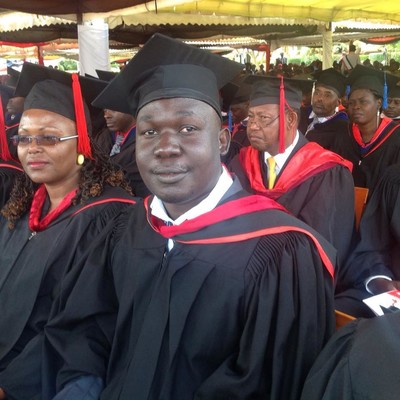
Ivan Onapito graduating from his MA in Practical Theology
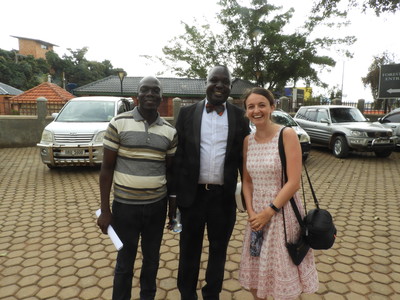
Ivan (middle) with current Cairdeas scholar, Toko (left) and Cairdeas Operations Director, Sarah
